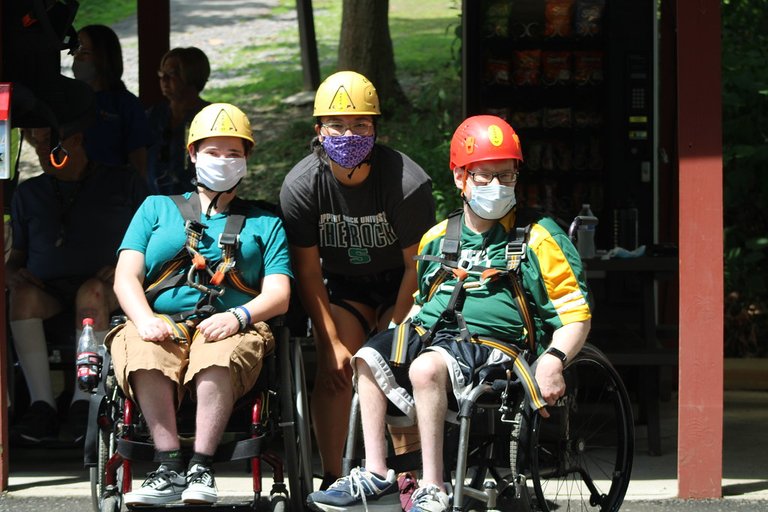The Spinal bifida
Hello, everyone! Today, I want to share with you the incredible stories and important information about Spina Bifida. This condition may sound unfamiliar to some, but it's crucial that we learn about it and understand its impact on individuals and families.

Spina Bifida is a type of birth defect that affects the spinal cord and sometimes the brain. There are different types of Spina Bifida, each with its own unique characteristics. Spina Bifida Occulta is the mildest form, Meningocele involves the protective covering around the spinal cord, and Myelomeningocele is the most severe type where the spinal cord protrudes through an opening in the spine.
What causes Spina Bifida? While the exact cause is not known, a combination of genetic and environmental factors are believed to play a role. One crucial factor is the importance of folic acid intake, particularly during the early stages of pregnancy to reduce the risk of Spina Bifida in babies.
Living with Spina Bifida comes with its own set of challenges. Individuals with this condition may experience physical symptoms like paralysis, orthopedic issues, and bladder and bowel problems. They may also face cognitive challenges, such as learning disabilities or difficulties with executive function. Additionally, the emotional and psychological impact of managing a lifelong condition can take a toll on mental health. Despite these challenges, many people with Spina Bifida demonstrate incredible resilience and determination in their daily lives.
Diagnosis and treatment of Spina Bifida require a multidisciplinary approach. Prenatal screenings can detect Spina Bifida early, allowing for timely interventions and planning. Postnatal care often involves surgical procedures to repair defects and prevent further complications. Rehabilitation and ongoing medical management are essential components of care to support individuals in reaching their full potential.
Day-to-day life for individuals with Spina Bifida involves adapting to their unique needs and challenges. From finding accessible educational and employment opportunities to building supportive relationships and utilizing assistive technologies, people with Spina Bifida demonstrate that with the right resources and determination, they can lead fulfilling lives.
Prevention and management of Spina Bifida are crucial aspects of care. Adequate folic acid intake before and during pregnancy, along with a healthy lifestyle, can lower the risk of Spina Bifida in newborns. Providing support and resources for individuals and families affected by Spina Bifida is essential in ensuring their well-being. Ongoing research and advancements in treatment offer hope for improving outcomes and quality of life for those living with Spina Bifida.
Advocacy and support play a pivotal role in raising awareness and promoting inclusivity for individuals with Spina Bifida. Organizations dedicated to Spina Bifida provide valuable resources and assistance to those in need, while advocacy efforts work towards creating a more inclusive and accessible society for all. By amplifying the voices and stories of individuals with Spina Bifida, we can foster understanding, acceptance, and support within our communities.
Personal narratives from individuals living with Spina Bifida and their caregivers offer insights into the daily triumphs and challenges they face. Their stories of perseverance, achievements, and positivity inspire us to embrace diversity and celebrate the strength of the human spirit in overcoming adversity.
In conclusion, Spina Bifida is not merely a medical condition; it's a journey of courage, strength, and resilience. By increasing awareness, providing support, and advocating for inclusivity, we can create a more compassionate and understanding world for individuals with Spina Bifida. Let's come together to support and uplift those affected by this condition and celebrate the diversity of human experiences.
References
- https://my.clevelandclinic.org/health/diseases/8719-spina-bifida
- https://www.webmd.com/parenting/baby/spina-bifida
- https://www.mayoclinic.org/diseases-conditions/spina-bifida/symptoms-causes/syc-20377860
- https://www.cdc.gov/ncbddd/spinabifida/facts.html
- https://emedicine.medscape.com/article/311113-overview
- https://www.nhs.uk/conditions/spina-bifida/


I am a complete beginner who resides in Africa's Western Hemisphere. My name is James, but you may reach out to me through the Facebook page [James Kossy] (https://www.facebook.com/christ.messenger.904) Physics, chemistry, and biology are the three topics that I find most enjoyable. My current studies are taking place at the university level, with the intention of becoming a recognized professional in physiotherapy. I am fascinated by all things technological, and I take pleasure in contributing to the fascinating technological advancements that are taking place throughout the world today. In my spare time, I'd like to learn more about programming and help others with any technical problems they may be having. 💞 ***🌹❤️ Thank you so much to everyone who has supported me thus far. ****💞 At the moment, I don't have the right words to say how much I appreciate all of your help. You never cease to astonish me with your generosity. For me, this has turned into a haven of enjoyment. Thanks to colleagues like you, this has all been possible. You've been a great support for me. Everything you have done for me and my family has been greatly appreciated, and I will always be grateful to you. 💕.
Posted Using InLeo Alpha
Just quite outrageous that in this world, life will throw to us what we don't ask for 😭
Imagine those innocent souls born with those Spina Bifida defect
Thanks for your contribution to the STEMsocial community. Feel free to join us on discord to get to know the rest of us!
Please consider delegating to the @stemsocial account (85% of the curation rewards are returned).
You may also include @stemsocial as a beneficiary of the rewards of this post to get a stronger support.